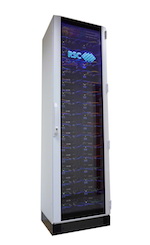 Today RSC Group announced the installation of a MVS-10P MP Petastream supercomputer at the Joint Supercomputer Center of the Russian Academy of Sciences (JSCC RAS). As is the first project in the Commonwealth of Independent States based on the latest Intel Xeon Phi 7120D coprocessors, the supercomputer weighs in at #20 of the Top50 list of the most powerful computing systems in Russia and CIS.
Today RSC Group announced the installation of a MVS-10P MP Petastream supercomputer at the Joint Supercomputer Center of the Russian Academy of Sciences (JSCC RAS). As is the first project in the Commonwealth of Independent States based on the latest Intel Xeon Phi 7120D coprocessors, the supercomputer weighs in at #20 of the Top50 list of the most powerful computing systems in Russia and CIS.
With such solution as MVS-10P MP massively parallel system based on the latest RSC PetaStream architecture, employees and scientists of numerous RAS research institutes and organizations can develop and optimize applications for future systems with massively parallel architectures and new multi-core processors. This includes such priority areas as development of mathematical model and program algorithms for extra massively parallel systems and pilot scientific and technological tasks. Russian scientists will be able to perform large-scale research in numerous key fundamental and applied knowledge areas that was previously impossible. This will inevitably assist further active development of Russian scientific and economical potential,” – said academician Gennady Savin, Director of JSCC RAS.
New MVS-10P MP computing system based on RSC PetaStream massively parallel architecture will enable RAS scientific teams to develop the latest applications for breakthrough R&D in such priority fields of Russian science as medicine, bioengineering, astrophysics, chemistry, radioelectronics, control systems and others.
The provided RSC solution based on Intel architecture enables users to run existing applications requiring high level of parallelism and create new applications without rewriting the code. All programs running on RSC PetaStream will be fully compatible with next-generation Intel Xeon Phi architecture code-named Knights Landing with over 3 TFLOPS computing power per socket, integrated support of new generation Intel Omni-Path interconnect network, increased memory size per core and a number of other revolutionary innovations. All these features will improve the efficiency of solving scientific, financial, engineering and other problems with better performance of each supercomputer node,” – said Dmitry Konash, Intel Regional Sales Director in Russia and CIS.



